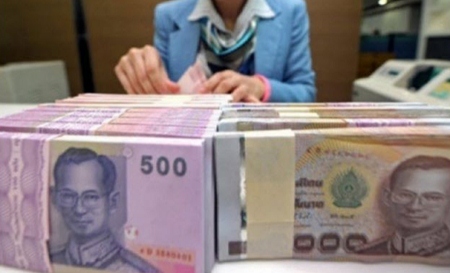The rising Thai baht, now less than Bt29 to the dollar, has dipped the value of Thailand’s industrial exports by more than Bt35.48 billion (US$1.22 billion) in the first two months of this year, according to the Ministry of Industry.
The Industrial Economics Office revealed that foreign capital inflows into Southeast Asia, including Thailand’s bond market, have contributed to the rapid appreciation of the baht.
Industry Ministry spokesman Nattapon Nattasomboon said more than US$4 billion was injected into the Thai capital market in January alone, compared to US$5 billion for the whole of last year.

He called on the Bank of Thailand (BoT) to stabilize the Thai currency to prevent severe negative impacts on industrial exports, indicating that the baht appreciation to Bt29 against the dollar has reduced the value of industrial exports by Bt384.7 billion (US$13.2 billion) while the industrial GDP dropped by 1.1 percent.
It was earlier estimated that Thailand’s industrial export growth would be 5-6 percent this year based on the exchange rate of Bt30.58 against the dollar. Now that the baht has risen rapidly, industrial export growth is expected to be 4-5 percent at most.
If the baht gains strength to Bt28 against the dollar, to 9.92 percent of GDP, the kingdom’s industrial export value will decline by Bt569.3 billion (US$19.6 billion) or 11.02 percent while industrial GDP growth will be only 1.5-2.5 percent instead of the originally estimated 5-6 percent.
Nattapon said foreign investments in Southeast Asia have increased given a forecast by the International Monetary Fund (IMF) that the region’s economy will expand 5.9 percent while the growth of US and European economies will slip.
The US economy will expand at only 1.9 percent whereas the Eurozone will shrink from the earlier forecast of 0.1 percent to 0.3 percent with France, Italy and Spain becoming the hardest-hit countries. Germany will continue to move forward.
Japan should see a 1.6 percent economic growth after the government announced quantitative easing. The country originally predicted a growth at only 1.2 percent.
He urged industrial operators to penetrate into the Southeast Asian market including Cambodia, Lao PDR, Myanmar and Vietnam, known as the CLMV group.
The Industry Ministry will propose to the Cabinet assistance measures for small- and medium-sized enterprises with a Bt10 billion fund in addition to the Bt3 billion already allocated for the purpose, he said.




